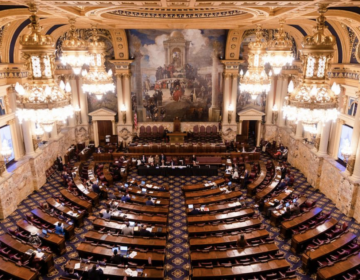Legal marijuana, big tax cuts, and minimum wage: This year’s Pa. budget losers
Major goals for both Democrats and Republicans fell by the wayside in Pennsylvania’s new $47.6 billion budget.

Pennsylvania State Capitol building in Harrisburg on July 26, 2023. (Amanda Berg for Spotlight PA)
This story originally appeared on Spotlight PA.
As they wrapped up votes on Pennsylvania’s new $47.6 billion budget last week, lawmakers agreed the plan wouldn’t make anyone completely happy.
The deal increases spending on public education for this fiscal year, but doesn’t guarantee future bumps. It sends more money to transit systems, but not enough to alleviate their concerns. Other major goals for both parties fell by the wayside: Democratic Gov. Josh Shapiro didn’t get recreational marijuana or a tax on skill games; legislative Democrats didn’t get a minimum wage increase; legislative Republicans didn’t get tax cuts.
“This was a good budget. It’s not a perfect budget. It’s not perfect for us. It’s not perfect for the Democrats, but it is the state of where we are in Pennsylvania,” state Senate President Pro Tempore Kim Ward (R., Westmoreland) told reporters Thursday night after both chambers passed the budget bills.
Though no one filled their bingo card, plenty made it into the final plan, which passed nearly two weeks after the June 30 deadline.
Along with new funding for education, which mostly went to poor schools, lawmakers agreed to new oversight measures on cyber charter schools. Republicans got some long-sought changes intended to speed up the environmental permitting process. And Shapiro notched a win on one of his key asks, securing $500 million to better prepare sites for industrial projects.
But many more priorities fell by the wayside. Here are the biggest ones.
Both parties’ big education asks
Education has been a centerpiece of Pennsylvania’s budget talks since 2023, when a Commonwealth Court judge ruled that the state’s funding scheme is so inequitable it violates the constitution. Without prescribing an exact remedy, the judge ordered lawmakers to fix the problem.
After making what lawmakers framed as a down payment for schools last year, many Democrats had hoped to include a more concrete plan for the future in this deal. A bill advanced by state House Democrats included a $5 billion commitment that would have been doled out over seven years. The money would have been distributed through a formula to school districts with high levels of students experiencing poverty and other challenges.
That number roughly represented what the plaintiffs in the funding case said was necessary to satisfy the ruling, but Republicans balked at committing to that much sustained spending. The final plan includes $1 billion in new funding for K-12 education, namely some increases to existing line items for basic and special education, and a significant chunk earmarked for a new “adequacy” supplement for the poorest schools. It doesn’t include future commitments.
“In our view, we have more than met the edict of the Commonwealth Court opinion,” state Senate Majority Leader Joe Pittman (R., Indiana) told reporters.
Two groups that helped bring the initial lawsuit, the Education Law Center and the Public Interest Law Center, issued a joint statement arguing lawmakers needed to make a more permanent change.
“The funds distributed this year through the new adequacy formula are critical, desperately needed, and will be used to hire the teachers, tutors, and counselors that students deserve,” they wrote.
But “the Pennsylvania Constitution requires more,” they added — specifically a timeline for increasing future spending.
Public education advocates are also frustrated by the new formula that determines how much supplemental funding schools will receive.
These advocates, along with Democrats, wanted to measure poverty using both census data and data that districts report on student eligibility for programs like cash assistance or Medicaid. These district-collected data are key, they argued, because it’s difficult to measure the amount of poverty in a district using only census data. Census data use a small sample size and include children who aren’t sent to public schools.
But Republicans criticized the district data as unreliable, a concern other stakeholders, including state Department of Education staffers, had previously raised. The GOP ultimately won out: The final formula just uses census data.
Meanwhile, taxpayer funding for private school vouchers, a top issue for state Senate Republicans, didn’t end up in the final deal. Shapiro supports the creation of such vouchers, but killed such a proposal last year to get state House Democrats on board with the budget. That decision led to a six-month impasse.
Ward blamed Shapiro for her caucus’ voucher push falling short this year, saying Thursday night that the governor “wasn’t going to use his bully pulpit to help us get that through the House.”
The Shapiro administration, which usually declined to comment on specifics while closed-door budget talks played out, also publicly rejected a GOP proposal to allow parents with children in private school to deduct up to $8,000 in such expenses from their state tax return.
Meanwhile, the budget’s lack of funding for child care worker recruitment and investment disappointed early childhood education groups.
The deal puts money toward a tax credit for businesses that help workers pay for child care, and also contributes new funds to the Pre-K Counts and Head Start Supplemental Assistance Programs. But advocacy groups Pre-K for PA and Start Strong PA said those moves fell short.
Programs like the tax credit, they wrote in a joint statement, are “a demand-side solution, helping families afford care. Pennsylvania must also invest in the supply side — stopping the exodus of child care teachers — for these tax credits to be effective.”
Shapiro’s moneymakers
To raise revenue, Shapiro’s initial budget pitch asked lawmakers to legalize recreational cannabis, and regulate and tax skill games. Getting either idea — both of which have been on and off the table for years — over the finish line would have been a major victory.
Support for fully legalizing cannabis has grown since the commonwealth allowed medical use of the drug in 2018, and since neighboring states have welcomed recreational use.
But this time around, the initiative, which Shapiro estimated would eventually bring in more than $250 million in annual tax revenue, was an early casualty in budget talks. Disagreements over how to structure the new industry bogged down the idea after a series of hearings.
Some Democrats signed on to a bill that would have created a state-run marijuana industry similar to the one that sells alcohol in Pennsylvania. But marijuana interests balked at that proposal, and some legislative Republicans oppose legalizing cannabis while it is still a federal Schedule 1 drug.
State Rep. Dan Frankel (D., Allegheny), a longtime advocate for recreational marijuana, said that the issue came down to a lack of consensus in his caucus on the logistics.
“To my knowledge, this was not a serious consideration in this budget negotiation this session,” Frankel told Spotlight PA.
Frankel said that he plans to work this summer on proposals addressing those concerns with state Rep. Napoleon Nelson (D., Montgomery) — the chair of the Legislative Black Caucus, for which legalization has been a priority. He added that there likely will not be enough session days in the fall to pass any legislation that comes out of those talks.
Legislative leaders were also unable to agree on how to regulate and tax skill games.
Skill games exist in a legal gray area in Pennsylvania. They have proliferated in bars, gas stations, and truck stops across the commonwealth, but they aren’t explicitly authorized by state law and therefore go untaxed.
A well-monied lobby supports them and is open to regulation, but doesn’t want high taxes. The similarly powerful casino lobby wants skill game operators to be subject to the roughly 50% tax they pay on slot machine revenue.
Shapiro’s plan would have taxed skill games revenues at 42%, a rate he projected would bring in $150 million in the coming fiscal year, and double that amount in the future.
Legislative leaders on both sides of the aisle favor some kind of regulation and taxation, but the complicated politics sank the measure.
During budget negotiations, Pittman said that there was general agreement on skill games and linked regulating them with funding Democratic priorities such as public transit. However, in the week before the final budget deal, he backtracked, saying that the move didn’t have enough support to reach “critical mass.”
Republicans frustrated on taxes, Dems on minimum wage
The parties at one point considered raising the minimum wage in exchange for cutting business-related taxes, Capitol sources told Spotlight PA.
The state’s minimum wage is $7.25 an hour, the federal floor. The legislature last voted to increase the wage in 2006. Raising it has been a constant focus for Harrisburg Democrats and their allies in organized labor. Despite some growing GOP support, including an aborted 2019 deal to raise the floor to $9.50, the wage hasn’t moved.
Republicans instead have called for lowering Pennsylvania tax burdens, particularly those for businesses. The Tax Foundation, a nonpartisan think tank, has rated the commonwealth’s tax burden to be above average for individuals and companies.
With bipartisan support, the state Senate passed a $3 billion tax cut plan that would lower the state’s flat, personal income tax and ax a tax on private electricity producers. The chamber has also pushed to quicken the planned reduction of the state’s corporate income tax, which started going down under a deal struck by former Democratic Gov. Tom Wolf.
None of the above ended up in the final deal. Still, some smaller tax changes were agreed to, including two deductions for businesses if they help their workers pay for child care or match their payments into a state-run college savings account.
Local concerns about transit, county mental health
As budget talks began this summer, transit agencies told lawmakers they needed more money, or they would be forced to cut services as federal stimulus dollars run out and ridership lags pre-pandemic levels.
The state’s largest transit agency, Philadelphia’s SEPTA, projected a $240 million operating deficit in the fiscal year that just began. The looming shortfall led to fears of significant service cuts.
The budget doesn’t come close to filling that gap. Lawmakers signed off on $80.5 million in one-time funding, earmarking about $53 million for SEPTA. A spokesperson told Spotlight PA that the funding gives the system more time to figure out solutions, and said immediate cuts are not on the table. But they did not say how long that state of affairs would last.
Democrats, like state Rep. Morgan Cephas of Philadelphia, said the one-time funding was a positive step “to keep SEPTA moving.”
State House Appropriations Committee Chair Jordan Harris (D., Philadelphia) told reporters there hadn’t been an allocation for public transit until “a couple days” before lawmakers voted on the budget. He echoed Cephas’ comments about revisiting more funding options in the future.
“It’s like the church,” Harris said. “The doors are always open.”
State Senate Republicans say they won’t address transit in a vacuum, and would prefer to also tackle road and bridge funding. And while Shapiro was tight-lipped about his future legislative agenda, he said Thursday night that Democrats and Republicans alike have committed to “finding a permanent solution for mass transit.”
Local officials and advocates also said they were disappointed by the budget’s relatively modest funding for mental health services.
Services such as outpatient treatment and crisis intervention are largely run by county governments, which get funding from the state to cover some of the costs. For a long time after the 2008 recession, state funding for those programs stagnated, and was cut significantly in 2012.
This is the second year in a row the state budget has given $20 million to county mental health services. But in a statement, John Buffone, a spokesperson for the County Commissioners Association of Pennsylvania, said the amount fails to counter years of underinvestment.
“Counties believed the $20 million increase that was provided in the 2023-2024 budget was a down payment and an act of good faith that the legislature and administration were ready to start making serious investments into the community-based mental health system,” he wrote. “Unfortunately, that was not the case.”
The new funding, he said, “will not help expand services, stabilize the workforce, decrease patient wait times or provide any realistic path to rebuilding a system that is crumbling before our very eyes.”

Get daily updates from WHYY News!
WHYY is your source for fact-based, in-depth journalism and information. As a nonprofit organization, we rely on financial support from readers like you. Please give today.




